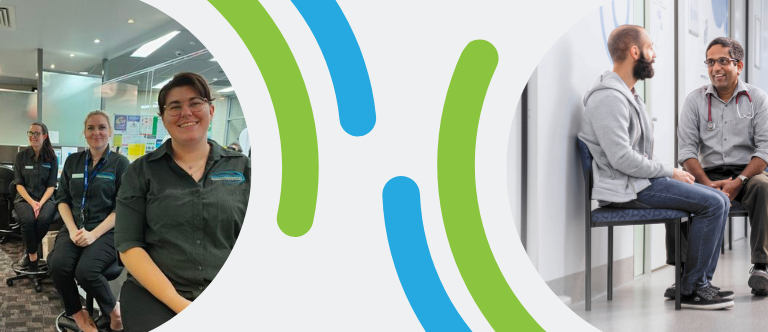
Sydney Street Medical: using patient feedback to support quality improvement
Sydney Street Medical is a well-established general practice in Mackay, Queensland, providing a broad range of health services including general
Please be advised that our offices will be closed from midday on Wednesday 24 December 2025 and will reopen at 9.00am (AEST) on Monday 5 January 2026.
We can be contacted by phone from Monday 5 January 2026. Alternatively, during the closure period you may call (07) 3855 2093 to leave a brief message including your name, contact number, and reason for call. We will return your call once our office reopens.
We wish all our clients a wonderful festive season and look forward to working with you in the New Year.

Patient Experience Week, held at the end of April, is an annual event to celebrate healthcare staff impacting patient experience every day. Patient Experience Week provides a focused time for organisations to celebrate accomplishments, re-energise efforts and honour the people who impact patient experience. From nurses and doctors, to support staff and executive professionals, to patients, families and communities served, Patient Experience Week hopes to bring together healthcare organisations across the globe.
To pay tribute to 2023 Patient Experience Week, CFEP Surveys approached the practice team at Inala Primary Care, who we consider industry leaders in prioritising patient care. Inala Primary Care CEO, Tracey Johnson, and Communications and Services Manager, Jacinda Sugars-Hogan, took time out of their busy schedule to answer our questions about the importance of prioritising patient experience and the valuable role patient feedback plays in implementing quality improvement initiatives. Read the full interview below.
A: Exceptional patient experiences mean providing more than good customer service and timely access to appointments. At Inala Primary Care, it means providing care that goes above and beyond what patients expect to receive at a normal doctor’s visit. Understanding who our patients are, where they come from, what their goals are, and how the right approach to care can impact their life is the foundation of what we do. We try and minimise waiting times and ensure the patient can always access a care team of their choice so that trust-based conversations about what matters to the patient are the norm.
A: When a patient visits our practice, they may be facing feelings of fear, trepidation, and uncertainty. Health issues can be stressful. Patients are often worried about their health conditions as well as financial issues and this can strain interactions with patient-facing staff. Patients expect more than treatment when they visit our practice – they want care. More importantly, patients expect to be shown that our team cares about everyone’s needs, situation, and well-being, which is demonstrated during every interaction. It is everyone’s responsibility within a practice to deliver exceptional patient experiences and help create a calm, reassuring environment for the patient and their family and carers.
A: We value patient feedback because it helps our organisation gauge whether our approach is meeting the needs of our community. Patients are at the centre of what we do. We all turn up to work, day in and day out to help support and care for our patients. If we did not value input from our patients, we could not call ourselves a patient-centred practice. For that reason, it is very common to hear our team talk about the patient journey. Where we can, we consider what the patient experience is like, and try to take the perspective of patients in our decision-making processes.
A: There are a few ways, we use a combination of surveys, online web forms, suggestion boxes, and text messages which prompt patients to leave feedback via reviews. Our practice manager also has an open-door policy where patients can speak with her regarding any concerns or queries. From time to time we mount patient consultation exercises to help co-design care or gather data that we can use in advocacy for new and improved services.
A: We have a very diverse patient base which includes patients from 148 ethnicities. This means there is no “one-size-fits-all” approach to care, and it can be quite challenging at times to meet the needs of all our patients in the right way. Understanding the diverse needs of our patients has been an ongoing challenge, and finding the right balance between patient care and what is financially, and logistically viable has been tough. Feedback loops help us to continuously look for ways to improve current practices. What we have learned is that responding to feedback is an ongoing commitment from the practice that will continue to evolve as the needs of our patients continue to evolve throughout the years. We also stay in touch with cultural groups and representatives of migrant and disease-specific organisations to try and improve our models of care to suit feedback generated by consultations those organisations are doing.
A: Currently we are undertaking a Patient Journey Mapping project at the practice, focusing on auditing the patient experience at all levels during a patient’s journey through our practice. Throughout this initiative we will analyse each patient touch point and assess ways in which we can optimise the patient experience and better our service offering as a practice. We know there are things we can do better and are committed to putting in the correct measures to ensure better experiences for our patients. We genuinely care and want to work on continuous improvement of our systems to better support positive patient experiences. We also have studies underway to assess some of our models of care. This provides more detail about whether our work in diabetes, hepatitis or with frequent attenders is actually hitting expectations. We are also planning a major IT upgrade around improvements to connectivity with patients and supporting more hybrid models of care.
A: In the past we carried out a patient survey and asked patients their honest opinions on the services we provide. We listened to patient concerns, reviewed the feedback and implemented a number of changes at the practice. The feedback prompted us to investigate our staffing ratios in the reception team which had not been scaled proportionately to support our growing practice. This feedback helped shape the creation of new roles in the reception team and identified opportunities for improvement of our current processes and procedures.
A: The best way to prioritise patient experiences is by understanding who your patients are and taking the time to listen and understand their concerns despite whatever else may be going on in the practice at the time. The better we can understand our patients, and what they may be facing when they walk through our doors, the better we can care for them and their needs. That is why we spend time analysing our practice data. Knowing how many patients have which conditions means we can prioritise quality improvement and clinical innovation efforts. We also assess visit frequency and are doing a major piece of work to assign patients to a “usual doctor” so that continuity of care is easier to organise for reception.
A: This has been something we have really struggled with in the past. Burnout has been a real threat to the medical world these past few years, and it has been easy to slip into a survival mindset when it comes to overcoming challenges in the workplace. This means staff morale has been tricky to maintain at times, and I’m sure we’re not alone in this struggle. Happy staff members look after your business, and in healthcare patients are our business. Through it all, we have tried to show appreciation when are where we can for our staff through team building activities, appreciation gifts, and publicly acknowledging good work; though this is something we have identified needs to be a bigger priority moving forward. We recently hosted a practice conference for our clinical team. This was a great success as our team prioritised their own professional development needs and also had time on South Stradbroke Island to do some socialising. We plan to run another weekend next year. We also have other social team events like dinners and parties. We are always trying to catch people “doing the right thing” and provide more instant positive feedback and recognition in person and via our team channel. Knowing how individual team members like to be recognised is important. Some like one-to-one verbal credit, others are excited by team acknowledgment, and others like gifts. We need to get to know our team as much as we get to know our patients. Otherwise, a well-intended affirmation can be a problem for that person.

Sydney Street Medical is a well-established general practice in Mackay, Queensland, providing a broad range of health services including general

Australia’s healthcare system faces significant challenges from the growing burden of chronic conditions. According to the Australian Institute of Health